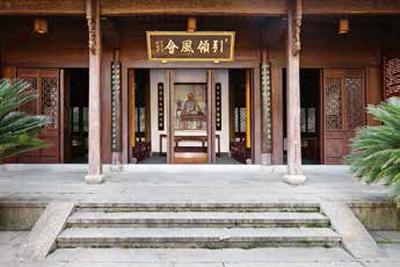Ruan Yuan is Honored on the West Lake
2019-02-25SunChangjian
Sun Changjian
The West Lake in Hangzhou honors a lot of ancient people more or less connected with the city. Take the Bai Causeway and the Su Causeway on the lake for example. The causeways respectively honor Bai Juyi of the Tang Dynasty (618-907) and Su Dongpo of the Song Dynasty (960-1279). In contrast with such big names, Ruan Yuan (1764-1849) is little known to most visitors and local residents even though some people know one of the three manmade islets on the lake was named after Ruan Yuan and called Ruan Gong Islet. Gong (公) that follows a surname in Chinese is a respectful title, usually used for ancestors in family genealogy books and highly esteemed personages.

The fa?ade of Ruan Yuan Exhibition on Ruan Gong Islet
Ruan Yuan served in Zhejiang for about 12 years, first as director of education administration and then twice as the provincial governor from 1795 to 1809. The only time he was not in Zhejiang in the 14 years period was when he served as a chief examiner of the imperial examination in Beijing.
While in Zhejiang, Ruan did a few things that have come down in history. First of all, he had the West Lake dredged. The lake, just outside the walled city, must be dredged every one hundred years. The history remembers the names of all these officials who raised funds and presided over the dredge project over centuries and dynasties. In 1800, he raised 45 million silver taels and had the lake dredged in a period of two years.
Part of the sludge scooped up from the lake bottom was piled up to form a small isle to the west of the Pavilion in the Middle of the Lake. The isle was named after Ruan.
For the following hundred years and more, the isle remained wild. The ground there was too soft to support buildings. Trees grew wildly. Birds stayed there. It was not until 1982 that a small garden was built on the 5600-square-meter islet after it was fortified with rocks on the edges and more than 1,000 tons of soil was put there. For a few years, it was a tourist attraction. Since the West Lake was made a UNESCO World Heritage Site in 2011, described as having “influenced garden design in the rest of China as well as Japan and Korea over the centuries” and reflecting “an idealized fusion between humans and nature”, the isle has been kept free of tourists.
Secondly, Ruan Yuan founded an academy of classical studies at the foot of Solitary Hill on the West Lake. The academy lasted about one hundred years from 1797 to 1904, with several shutdowns in between due to wars. The academy was originally designed as a site for scholars to compile an encyclopedia of ancient classics. Then it became a school with a focus on ancient classics that went back to the Han Dynasty instead of the studies of the School of Principle, founded in the Song Dynasty. Specifically, students studied philology, astronomy, geography, and mathematics at the school. For a while, the academy was Chinas very center of mathematics. In 1799, Ruan Yuan presided over the compilation of a series of biographies of over 200 Chinese mathematicians and astronomers, the first of its kind in China. An appendix of the book included 37 foreign scholars of science such as Euclid, Copernicus, and Matteo Ricci. The most famous teacher of the academy was probably Yu Quyuan (1821-1907) who taught at the academy for about 30 years. And the most famous graduate of the academy was probably Zhang Taiyan (1869-1936) who spent 7 years studying under the guidance of Yu Quyuan.

A panorama of Ruan Gong Islet on the West Lake
In 1809, the last year he was in Hangzhou, Ruan founded Linyin Collection of Books, a public library at Linyin Temple, the biggest Buddhist sanctuary in Hangzhou. It was the first of its kind in the province. Also in Zhejiang, he presided over the compilation and publishing of . The series included over 1,400 volumes in 180 titles. He also presided over the compilation of .
Ruan Yuan had a smooth career as high-ranking government official during the reign of three emperors of the Qing Dynasty. As one of the best known scholars of his time, he was appointed a tutor to the crown prince.
Ruan Gong Islet has a room dedicated to the life story of Ruan Yuan. Unfortunately, it is not open to tourists anymore. Despite what he did in Zhejiang and how famed scholars such as Liang Qichao, Wang Guowei, Hu Shi and Qian Mu spoke highly of him, Ruan Yuan remains little known to the public. Most people in Hangzhou have no idea that his memorial temple still exists at the foot of Wu Hill in downtown Hangzhou.
In Hangzhou, a city of history and culture, Ruan Yuan is little known probably for two reasons: he did not write any memorable poems. And the islet named after him on the lake stays closed to tourists.
